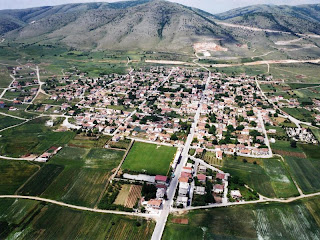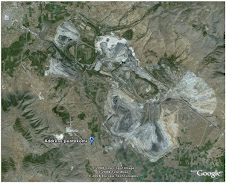
Την «μετακόμιση» ενός ολόκληρου χωριού σχεδιάζει η ΔΕΗ, σύμφωνα με τα όσα μεταδίδει το ειδησεογραφικό δίκτυο Bloomberg. Το 1.300 κατοίκων χωριό Ποντοκώμη, βρίσκεται πάνω σε κοιτάσματα 50 εκατ. τόνων λιγνίτη, γεγονός που εμποδίζει τη ΔΕΗ να αξιοποιήσει τα εν λόγω αποθέματα.
Σύμφωνα με το δίκτυο Bloomberg, η ΔΕΗ καταφεύγει σ΄αυτή τη λύση, η οποία δεν είναι και τόσο αποδεκτή από την πολιτική της Ε.Ε. σχετικά με την προστασία του περιβάλλοντος, μετά την αρνηση της κυβέρνησης στην πρόταση αύξησης των τιμολογίων της ΔΕΗ, ώστε να ικανοποιήσει τις απαιτήσεις για συστήματα φυσικού αερίου. Συνέπεια των παραπάνω, σύμφωνα με το δίκτυο Bloomberg, είναι να μπει η ΔΕΗ σε νέο κύκλο δαπανών, ώστε να εξασφαλίσει τις αδειες αξιοποίησης συτής της ρυπογόνας μορφής ενέργειας, γεγονός που θα επιβαρύνει περεταίρω τα αποτελέσματα της εταιρείας.
Σύμφωνα με έρευνα που διενήργησε για την ΔΕΗ το Bloomberg, αυτή η επιβλαβής επίδραση της ΔΕΗ στο περιβάλλον, ίσως επωφελήσει τους μετόχους της εταιρείας, οι οποίοι είδαν τη μετοχή της εταιρείας να υποχωρεί κατά 67% το 2008, πραγματοποιώντας τη χειρότερη πορεία μεταξύ των 32 εταιρειών που περιλαμβάνονται στον πανευρωπαϊκό δείκτη Dow Jones Europe Stoxx Utilities.
Συγκεκριμένα, η ΔΕΗ η οποία ελέγχει το 96% της εγχώριας παραγωγής, παραμένει σε σύσταση «αγοράς» για τους 10 από τους 16 αναλυτές του Bloomberg, οι οποίοι θεωρούν ότι η τιμή της το 2009 θα σημειώσει άλμα 42% στην κεφαλαιαγορά της Αθήνας.
Θετική προοπτική θεωρείται και το γεγονός ότι όταν το 2012 θα έχουν ολοκληρωθεί όλες οι υποχρεώσεις της ΔΕΗ αναφορικά με την εκμετάλλευση του λιγνίτη, τότε θα έχει στα χέρια της την πιο φθηνή μορφή ενέργειας, σε αντίθεση με το πετρέλαιο ή το φυσικό αέριο, σύμφωνα με τον αναλυτή της HSBC Pantelakis Securities SA, Paris Mantzavras.
Το πλήρες ρεπορτάζ του blooberg έχει ως εξής:
Public Power’s Drive for Coal Defies EU Carbon Policy (Update2)
By Maher Chmaytelli and Maria Petrakis
Dec. 19 (Bloomberg) -- Just as the European Union imposes the world’s toughest restrictions on carbon emissions, Public Power Corp., Greece’s biggest utility, plans to relocate an entire village to exploit the coal beneath it.
PPC, as the unprofitable Athens-based company is known, plans to move the 1,300 residents of Pontokomi because the town sits on about 50 million tons of lignite, the soft, brownish- black coal that generates about two-thirds of the country’s electricity.
Greece, the fifth-poorest of the 15 countries in the euro region, is growing more dependent on lignite after the government denied PPC’s request to raise energy prices enough to pay for cleaner natural gas-fed turbines. The utility may fall farther behind EU rules because the European agency will require utilities pay for all their emission permits as of 2013, sapping funds that could have been used to curb pollution.
“Lignite mining will still be the most cost-effective option for Public Power,” said David Cox, managing director of Poyr Energy Consulting in Oxford, England. “It’s hardly in line with the EU’s efforts to tackle climate change, but the company’s hands are tied.”
Lignite-fired units cost about 30 euros ($38) a megawatt- hour, according to the Hellenic Transmission System Operator, the manager of the Greek electricity grid. When oil climbed to a record in July, natural-gas costs were around 85 euros a megawatt-hour, according to the group.
Worst-Performing Stock
What’s bad for the environment may be good for PPC shareholders, who saw the value of their stock slump 67 percent this year, the worst performance in the 32-member Dow Jones Europe Stoxx Utilities Index. The company, which controls 96 percent of the nation’s power capacity, remains a “buy” among 10 of 16 analysts followed by Bloomberg. PPC will rise 42 percent in Athens trading to 16.95 euros in the next year, according to data compiled by Bloomberg. The stock fell 5.6 percent to 11.92 euros today.
PPC expects to report a full-year loss, its first in at least 10 years, after costs rose and the government, which owns a 51 percent stake, granted only limited price increases. PPC didn’t reply to telephone calls and e-mails seeking comment.
Even after 2012, when Public Power will have to pay for all its carbon permits, lignite would be cheaper as long as CO2 permits are trading around 25 euros a ton and oil isn’t lower than $60 a barrel, according to Paris Mantzavras, an analyst at HSBC Pantelakis Securities SA in Athens.
Carbon Permits
Carbon permits for December 2012 traded at 17.55 euros a ton on the Intercontinental Exchange today. 18. Oil for delivery the same month was $67.56 a barrel in New York yesterday.
“It makes a lot of sense for them to run lignite plants,” Mantzavras said.
The residents of Pontokomi voted unanimously for relocation in September after PPC pledged 185 million euros to build new homes, roads and schools, said Giorgios Dakis, the local prefect.
“That’s not enough,” said Andreas Athanassiades, the village schoolteacher. “We need double that, and we need PPC to put in filters to the power plant, cover the conveyor belts in the mines, and plant trees in the mines that are exhausted.”
The move demonstrates the limits of the EU’s push to curb greenhouse gas emissions by 20 percent, compared with 1990 levels, by 2020.
‘Polluting so Much’
“When you’re polluting so much, like PPC, it’s easy to cut pollution,” said Arthouros Zervos, chairman of the Brussels- based Global Wind Energy Council, an industry lobby group. CO2 emissions from PPC’s lignite-fired power plants totaled about 43 million tons in 2005.
Greece is the second-largest producer of lignite in the EU after Germany. A total 1.3 billion tons of lignite have been mined in the country, and the remaining 3.1 billion of exploitable reserves can last more than 45 years, according to PPC’s Web site.
Electricity demand in Greece grew 50 percent in the last decade, according to data compiled by the U.S. Energy Department. The country needs to increase capacity by 6,000 megawatts to guarantee supplies through 2015, according to the national energy regulatory authority.
Pontokomi will be the seventh village in Kozani, the region of northern Greece that produces 70 percent of the nation’s electricity, moved since the early 1970s.
The town’s residents are descendents of Greek refugees who fled Turkey in the Black Sea wars early last century.
“I grew up listening to stories of my family’s exile, the war, and my father telling me how grateful we should be to have found a new home,” Athanassiades said. “It’s a wrench that we have to leave again.”
To contact the reporters on this story: Maher Chmaytelli in Athens at mchmaytelli@bloomberg.netMaria Petrakis in Athens at mpetrakis@bloomberg.net
Last Updated: December 19, 2008 12:02 EST









.gif)














Δεν υπάρχουν σχόλια:
Δημοσίευση σχολίου